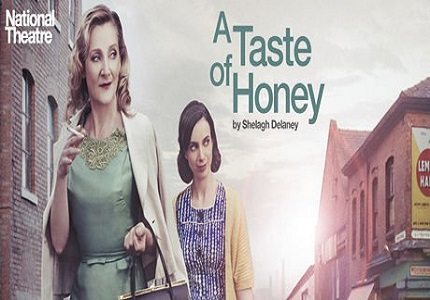 A revival of Shelagh Delaney's A Taste of Honey (1958) has just opened at the National Theatre, with Lesley Sharp and Kate O'Flynn playing the mother and daughter carving out some kind of existence in a drab flat in Salford. Delaney was only nineteen when she wrote the play, and there is a feeling throughout of a young person's acute observations and ear for speech pouring through the text, bringing energy, affection and sharp intelligence to a picture of pain and struggle. Describing the 'plot' would make the play sound like a misery-fest: faithless sailors, drunkards, shattered dreams, unplanned pregnancy, a central relationship constantly teetering on breaking point. Ee but it's grim. Yet what comes over most strongly is the verbal energy, the crackling, give-as-good-as-you-get exchanges, a salty and unsentimental sparring that is the escape route from self-pity, the sound of the refusal to despair.
A revival of Shelagh Delaney's A Taste of Honey (1958) has just opened at the National Theatre, with Lesley Sharp and Kate O'Flynn playing the mother and daughter carving out some kind of existence in a drab flat in Salford. Delaney was only nineteen when she wrote the play, and there is a feeling throughout of a young person's acute observations and ear for speech pouring through the text, bringing energy, affection and sharp intelligence to a picture of pain and struggle. Describing the 'plot' would make the play sound like a misery-fest: faithless sailors, drunkards, shattered dreams, unplanned pregnancy, a central relationship constantly teetering on breaking point. Ee but it's grim. Yet what comes over most strongly is the verbal energy, the crackling, give-as-good-as-you-get exchanges, a salty and unsentimental sparring that is the escape route from self-pity, the sound of the refusal to despair. The programme contrasts the working-class realism of Delaney with the drawing room dramas of Rattigan and Coward (it was watching a Rattigan play and feeling she could do better that apparently spurred Delaney into writing the script and sending it to Joan Littlewood); and the situations - unmarried pregnant girl helped by gay art student while mum is being left by boozy good-for-nothing charmer! - must have seemed shockingly new to Londoners in the 50s. Yet in retrospect one also sees links between the theatrical generations: it is not such a distance from the lonely world of, say, Separate Tables, to Delaney's Salford; and beyond the class gap there is surely a continuum between the verbal punch-ups of Private Lives and the give-and-take of a Taste of Honey. Drama, after all, lives on dysfunction. A Rattigan drawing room can contain a whole cosmos of grief. A further context is the new literature depicting working-class life, described by Richard Hoggart in The Uses of Literacy and fictionalised by John Braine, Alan Sillitoe, David Storey, Barry Hines et al. While Jeanette Winterson's programme essay rightly stresses how theatre at the time was a man's world, it's worth remembering there were other kindred spirits in the literary sphere - Nell Dunn, Margaret Forster and - closest of all perhaps to the situation of the play - Lynne Reid Banks's The L-Shaped Room, sensitively adapted as a film by Bryan Forbes. Delaney's work now appears as a distinctive part of the complex revelation (to the rest of the country) of the lives of working people. It is a world open to the Hovis-ad sentiment, and we need to recalibrate our imaginations to recapture the real world in which these women live: the photos of the Salford of the time point to a dismal poverty scarcely distinct from Orwell's Wigan.
The NT production brought out the strengths of the play, which are surely the full-blooded women's parts. While admiring the lead actresses' physical and vocal relish for their roles, I was left wondering whether this richness is won at the cost of somewhat one-dimensional male parts. So be it: it is in the introduction of specifically women's issues that the play now seems most revolutionary. There is the usual NT issue of filling huge spaces. Though this was at the Lyttleton not the Olivier, the design team made the simple drab flat setting into something bigger and more beautiful, with a revolving set, atmospheric attic, silhouette of the gasworks and suggestion of a row of terraced houses. This does place the characters in a larger society, but the claustrophobic world of the play seems to call out for an intimate space. Two hours and a half of largely plotless dialogue was pushed along with great energy, spots of choreography (though do you really need a 'movement director' to do about twenty seconds of hoofing around with a broom?) and some mellow jazz.
After A Taste of Honey Delaney virtually stopped writing. Apparently she was stung by poor notices of her next play, The Lion in Love, and her precarious self-confidence toppled. Then nothing happened for about twenty years, apart from some stories, after which she did some radio work (and films: I had no idea she did the screenplay for Dance with a Stranger). One senses there must have been more to this silence than bad reviews. Perhaps she said what she had to say in this one piece? The play ends with a song to new life, and whatever the reasons for her silence, Delaney's work had many children: the lyrics of Morrissey, the films of Mike Leigh and Ken Loach, Coronation Street, Our Friends in the North. Yet her voice remains distinctive, tragic and comic, strident and tender, and it was good to have a chance to hear it so clearly delivered in this resonant production.